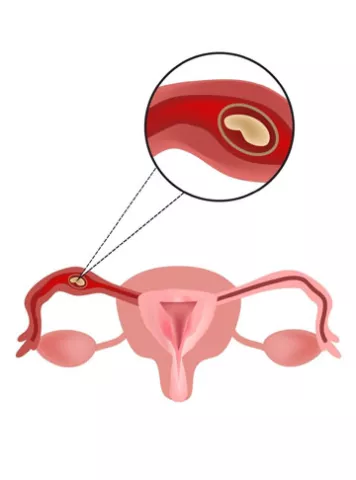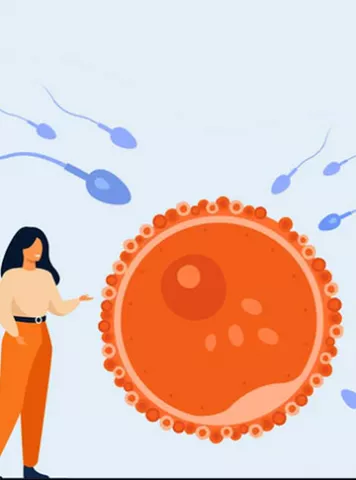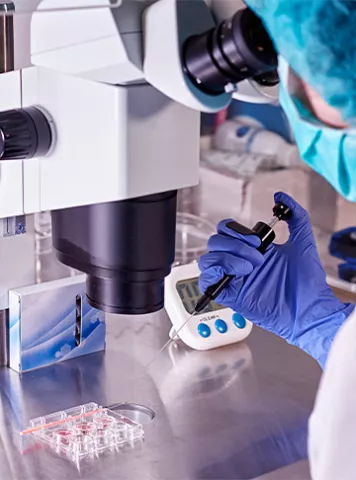What happens during an IVF Pregnancy?
IVF and Pregnancy have become pretty common words as IVF has helped many people start their happy families through seamless pregnancy. It is a widely used assisted reproductive technique today for couples who are not able to conceive naturally.
In vitro fertilization, or IVF, involves a series of procedures to help you with getting pregnant. During the procedure, the ovary is stimulated with medications, and then the eggs are extracted from the female and fertilized in the lab with the sperm. Once the eggs are fertilized, the healthy embryos are transferred to the uterus. Let's understand this entire process in detail.
The most common steps that happen are as below –
1. Suppressing the Natural Menstrual Cycle
You are given medications to suppress your natural menstrual cycle, which makes the medicines used in the ovulation stage more effective. The medication is administered either as a nasal spray or as a daily injection that you will learn how to administer on your own. This is done for around two weeks.
2. Stimulate the Ovary
Follicle-Stimulating Hormone (FSH), a fertility hormone, is taken after your natural cycle has been inhibited. Your ovaries generate more eggs when FSH is present. This allows for the collection and fertilization of more eggs. The concerned clinic has a wider selection of embryos to employ in your IVF conception because there are more fertilized eggs available.
Also, throughout the course of your therapy, the clinic will monitor you and perform every essential IVF pregnancy test. You'll get blood tests and vaginal ultrasound scans to keep an eye on your ovaries. You will receive an injection of the hormone human chorionic gonadotropin (hCG), which aids in the maturation of your eggs prior to having your eggs harvested.
3. Egg Extraction
The eggs will next be extracted using a quick surgical procedure called follicular aspiration. It is typically performed at your doctor's office as an outpatient procedure.
A tiny needle will be inserted into each of your ovaries through your vagina by your doctor under the guidance of ultrasound throughout the process. A tool attached to the needle suctions the eggs out one at a time. You'll likely receive medication beforehand to make you comfortable. Later, you could have some cramping, but this normally goes away in a day.
4. Fertilization of Eggs
To fertilize the obtained eggs, your partner's or the donor's sperm is combined with them in a lab. In some circumstances, it would be necessary to inject each egg with a separate sperm. This procedure is known as ICSI (Intracytoplasmic Sperm Injection). Before being placed into the womb, the fertilized eggs (embryos) continue to develop in the lab for up to 6 days. Only the top 1 or 2 embryos (in terms of health) are transferred.
You will get hormone medications after egg collection to aid in preparing the lining of your womb to receive the embryo. Typically, this is administered as a gel, an injection, or a pessary put within your vagina.
5. Embryo Transfer
You must always discuss the number of embryos to be transferred before the start of the procedure. The embryos are placed in your womb a few days after the eggs are harvested. This is accomplished by inserting a tiny tube known as a catheter into your vagina.
You won't typically need to be sedated because this process is less complicated than egg collection and comparable to having a cervical screening test. However, the number of eggs transferred might depend on the age of the woman –
- Only one embryo should be transferred during the first pregnancy IVF cycle for women under the age of 37. If one or more high-quality embryos are available during their second IVF round, they should only undergo one embryo transfer. Only in cases when there are no high-quality embryos available should doctors think about using two embryos. No more than 2 embryos should be transferred during the third IVF round.
- If there are one or more good-quality screened embryos, women aged 37 to 39 in their first and second full IVF cycles should also have a single embryo transferred. Only in the absence of superior embryos should a double embryo transfer be taken into consideration. No more than 2 embryos should be placed during the third cycle.
- Women who are 40 to 42 years old could have double embryos transferred.
What Happens After Embryo Transfer?
You will be instructed to wait roughly 2 weeks before taking an IVF pregnancy test to determine whether the therapy was successful after the embryos had been placed in the womb.
While some clinics may advise performing a routine urine pregnancy test at home and informing them of the results, others would prefer that you visit the clinic for a more precise blood test. The tension of not knowing if the treatment has been successful can make this two-week wait a very tiring time. It can be the most difficult aspect of treatment for some people. You might find it helpful during this time to speak with a counselor through the fertility clinic or to get in touch with others who are experiencing a scenario similar to yours. If you do get pregnant, ultrasounds will be done in the next weeks to make sure everything is developing as it should. The standard antenatal care provided to all pregnant women will then be made available to you.
Unfortunately, IVF can also fail sometime; therefore, you should try to be ready for this eventuality. If treatment doesn't work, you can always try again. Moreover, during this challenging period, you might find support groups for fertility or counseling beneficial.
How Long Does IVF Take?
IVF can sometimes take time. You will need to talk to the doctor and get an overall idea of what the process includes. Also, you and your partner will have to undergo several medical examinations such as ultrasound, sperm analysis, blood work, and many more. Next, when the actual process starts, it might take more than 3-4 weeks, depending on the patient.
If you are pregnant on the first attempt, then the pregnancy will follow several ultrasound tests to ensure everything is fine. However, if you are not pregnant, then you may have to undergo a second IVF cycle depending on doctor’s suggestion and your decision.
Are there any risks of Pregnancy with IVF?
There are few risks and complications involved in IVF. Medical risks include overstimulation of the ovaries, called OHSS (Ovarian Hyperstimulation Syndrome). Apart from this, there are several factors that might increase the risk of pregnancy complications, such as - smoking, obesity, alcohol consumption, etc.
Some of the common complications during IVF pregnancy are –
- High blood pressure
- Premature birth
- Blood clots in early pregnancy
- Birth by cesarean section
- Vaginal bleeding
If any risk or complications arise, it is important to talk to your doctor. Also, you must always discuss the possible risks and complications before the procedure.
Pregnancy and IVF are the best combinations today. It is a safe and very effective fertility treatment. However, the chances of conceiving after one IVF procedure depend on the age and the medical condition of the patient. You must always choose the top fertility clinic, like Indira IVF, where the procedure is carried out safely, with highly experienced fertility doctors having immense knowledge and expertise about the IVF procedure. At Indira IVF, we understand that IVF conception can be an expensive and emotionally challenging process for couples struggling with infertility. So, if you are struggling with infertility and want to know how to achieve a successful pregnancy with IVF, book a Free Consultation with us today. Call 18003092323 to get started.
Articles
2023


Guide to infertility treatments IVF
एक्टोपिक प्रेगनेंसी के लक्षण, कारण और इलाज
प्रेगनेंसी की खबर महिला को का�...
2023


IVF Guide to infertility treatments
टेस्ट ट्यूब बेबी का खर्च कितना आता है (What is the test tube baby cost in hindi)
पिछले कुछ वर्षों में टेस्ट ट्�...
2023


What Causes High Estrogen in Women
Estrogen is a very important hormone in a female’s body. It is especially ne...
2023


How early can a pregnancy be detected in IVF?
The happy news of pregnancy arrives after the successful completion of the fer...
2022


Guide to infertility treatments IVF
थाइरायड असंतुलन के कारण हो सकती है निःसंतानता, आईवीएफ से कैसे हो सकता है।
पिछले कुछ वर्षों में थायराइड �...
2022


पुरूष निःसंतानता का एक कारण वेरिकोसिल आधुनिक तकनीकों से संभव है पिता बनना
पुरूष निःसंतानता शब्द कुछ सा�...


गर्भधारण के लिए कितनी होनी चाहिए शुक्राणुओं की संख्या
निःसंतानता एक ऐसी समस्या बनत�...
2022


आईवीएफ क्या है (IVF Kya Hai) डिटेल में जानिए, आईवीएफ में कैसे होता है गर्भधारण
समय के साथ हमारी प्राथमिकताओ�...
Pregnancy Calculator Tools for Confident and Stress-Free Pregnancy Planning
Get quick understanding of your fertility cycle and accordingly make a schedule to track it
















